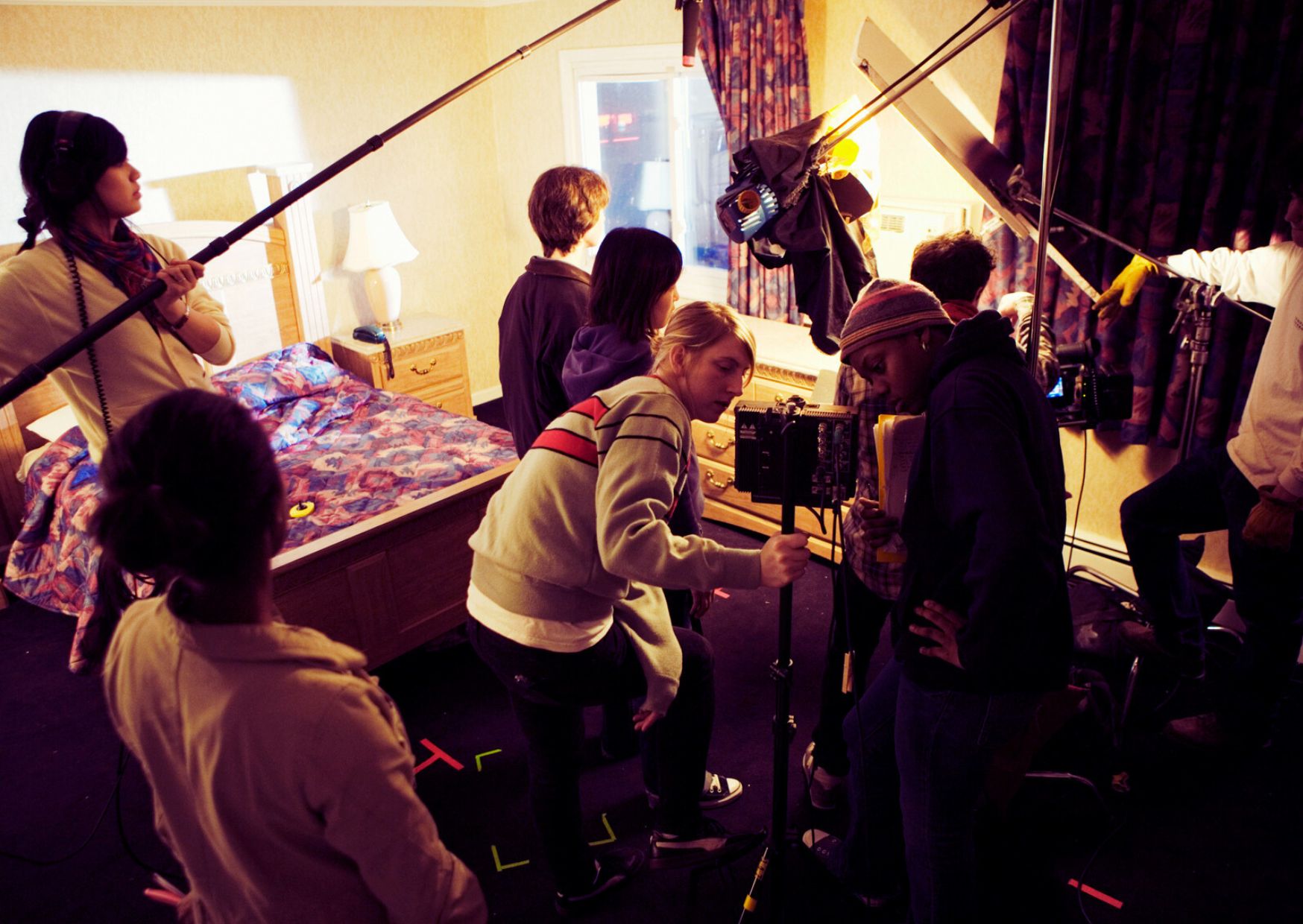Intimacy Coach for Actors: Navigating Vulnerable Spaces in the Film Industry
Jan 13, 2025
The film industry, renowned for its captivating storytelling and visual artistry, is also a space where actors often face unique challenges, especially in scenes involving intimacy. As an intimacy coach for actors, I aim to support performers as they navigate the emotional complexities of their craft. With the growing use of intimacy coordinators and the implementation of intimacy coordinators on set, the industry is taking significant strides in addressing the nuanced needs of actors performing intimate scenes.

The Rise of Intimacy Coordination
The role of the intimacy coordinator gained significant traction within the industry following movements like #MeToo, which highlighted issues such as sexual harassment and power dynamics in Hollywood. While intimacy coordinators already existed in the realm of live theater, the push for their inclusion in film and television has expanded dramatically. Intimacy Directors International, a nonprofit organization, has been instrumental in developing protocols for the use of intimacy coordinators on set.
The implementation of intimacy coordinators ensures that scenes involving nudity, simulated sex, and physical contact are choreographed with respect for the actor's boundaries. According to Intimacy Directors International, their work is distinguished from intimacy directors who are associated with live performance, focusing instead on television and streaming platforms. This shift has been a game-changer for actors, providing a safety net in hyper-exposed scenes.

Challenges Faced by Actors in Intimate Scenes
Actors, particularly women, routinely face challenges in performing scenes of intimacy. The hyper-exposed nature of these moments can lead to feelings of vulnerability and discomfort. Issues like power dynamics, suggestive movements, and the absence of modesty garments on set have historically created an unsafe environment. With the rise of intimacy coordination, these concerns are being addressed with recommended standards and protocols.
For example, nudity riders are now common practice, ensuring clear agreements regarding intimate scenes. These riders protect actors from unexpected changes and provide a framework for consent. As an intimacy coach, I focus on helping actors build the emotional resilience needed to navigate these challenging moments. By addressing their concerns and providing tools to manage stress, I empower them to approach their work with confidence.

Notable Developments in the Industry
The growing importance of intimacy coordinators can be attributed to pioneers like Amanda Blumenthal and Ita O'Brien. Furthermore, intimacy coordinator Amanda Blumenthal has been at the forefront of establishing best practices. Her work has gained significant traction, influencing how productions approach scenes of intimacy.
The British actors' union created guidelines for scenes involving simulated sex and physical contact, demonstrating a global commitment to actor safety. Similarly, the US Actor's Association SAG-AFTRA created new policies to address these issues. These advancements highlight the industry's dedication to fostering a safer work environment.
The significance of these developments was further emphasized in an August 2022 Feminist Media Studies article, which detailed the evolution of intimacy coordination. Authored by Sørensen Inge Ejbye, the study revealed how actors joined the movement to create safer working environments, addressing long-standing issues related to sexual harassment throughout Hollywood.

My Role as an Intimacy Coach for Actors
As an LA native and someone who grew up close to the film industry, I understand the unique pressures actors face. I have worked with a few actors who have expressed to me the emotional toll performing intimate scenes can have. Their experiences have given me valuable insights into the importance of emotional support for actors.
In my role, I provide:
-
Emotional Preparation: Helping actors explore their feelings about intimate scenes.
-
Boundary Setting: Assisting in creating personal and professional boundaries.
-
Stress Management: Teaching techniques to manage anxiety and pressure.
-
Empowerment Tools: Building confidence through self-awareness and assertiveness.
By focusing on these areas, I aim to complement the work of intimacy coordinators and enhance the overall well-being of actors.

Tools and Techniques for Actors
Actors often need practical tools to navigate intimate scenes effectively. Here are some strategies I recommend:
-
Communication: Open dialogue with directors, intimacy coordinators, and fellow actors is essential for ensuring everyone feels safe and respected. Previous agreements regarding intimate scenes should be revisited regularly to ensure continued consent.
-
Mindfulness Practices: Techniques such as meditation and breathing exercises can help actors stay grounded during hyper-exposed scenes. These practices are particularly beneficial in managing the emotional and physical demands of their roles.
-
Visualization Exercises: Mentally preparing for scenes involving simulated sex can help actors approach their performances with confidence. By visualizing themselves successfully navigating a challenging scene, they build emotional resilience.
-
Physical Warm-Ups: Engaging in movement exercises before filming can release tension and foster trust between scene partners. Movement directors, who specialize in creating physical choreography, can also be invaluable in this process.

Navigating Industry Reactions
The introduction of intimacy coordinators has sparked a wide range of industry reactions. While many applaud the positive changes, there are also skeptics who question the necessity of this role. Negative industry reactions often stem from misconceptions about the work of intimacy coordinators and a lack of understanding about their expertise and training.
However, the positive industry reactions far outweigh the negatives. The Hollywood Reporter highlighted several instances where the use of intimacy coordinators improved the on-set experience for actors. These professionals have brought attention to previously overlooked issues, such as the need for modesty garments and clear protocols for filming scenes involving nudity and simulated sex.
In one notable case, the Women's Center collaborated with Intimacy Directors International to provide additional resources for actors. This partnership underscored the importance of nonprofit organizations in advocating for actor safety and well-being.
Supporting a Culture of Safety and Respect
The #MeToo movement revealed the extent of sexual harassment throughout Hollywood, prompting significant changes in how the industry approaches intimate and hyper-exposed scenes. Laws surrounding intimacy filming standards now prioritize the well-being of actors, creating a safer environment for everyone involved.
One of the most significant changes has been the development of nudity riders, which outline the expectations and boundaries for scenes involving nudity and simulated sex. These agreements provide actors with a clear understanding of what will be required of them, reducing the potential for misunderstandings and ensuring their comfort.
Furthermore, the role of intimacy coordinators has expanded to include advocating for actors during negotiations. Talent agencies, such as Carey Dodd Associates, have embraced this shift, recognizing the importance of protecting their clients' interests. Intimacy coordinator Miriam Lucia emphasized the need for continued advocacy, stating that "actors deserve to feel safe and respected in every scene they perform."

The Future of Intimacy Coordination
As the film industry continues to evolve, the use of intimacy coordinators is expected to become standard practice. Organizations like Intimacy Directors International, a nonprofit dedicated to promoting best practices, will play a crucial role in shaping the future of this field.
The implementation of recommended standards and protocols has already led to significant improvements in how intimate scenes are handled. However, there is still work to be done. Directors who are associated with live performance must adapt their methods to align with the unique demands of television and streaming platforms. Similarly, actors must be provided with ongoing support to navigate the challenges of their craft.
What's Next?
The film industry has come a long way in addressing the needs of actors performing intimate and hyper-exposed scenes. With the implementation of intimacy coordinators, modesty garments, and nudity riders, the focus on actor safety and consent is stronger than ever. Organizations like Intimacy Directors International continue to advocate for best practices, ensuring that actors feel supported and empowered.
As an intimacy coach for actors, my goal is to bridge the gap between emotional well-being and professional performance. By providing tools, guidance, and a safe space for exploration, I help actors navigate the complexities of their craft with confidence and resilience. Together, we can create a film industry where every performer feels respected, valued, and empowered.
Looking forward, the continued collaboration between intimacy coordinators, actors, and industry professionals will be essential in fostering a culture of safety and respect. By prioritizing open communication and setting clear boundaries, the film industry can ensure that every actor feels supported in their work. Whether it's through the use of intimacy coordinators on set or the development of new training programs, the future of the industry is brighter than ever.
SUBSCRIBE TO MY WEEKLY BLOG EMAILS!
Make sure to check your spam folder!

